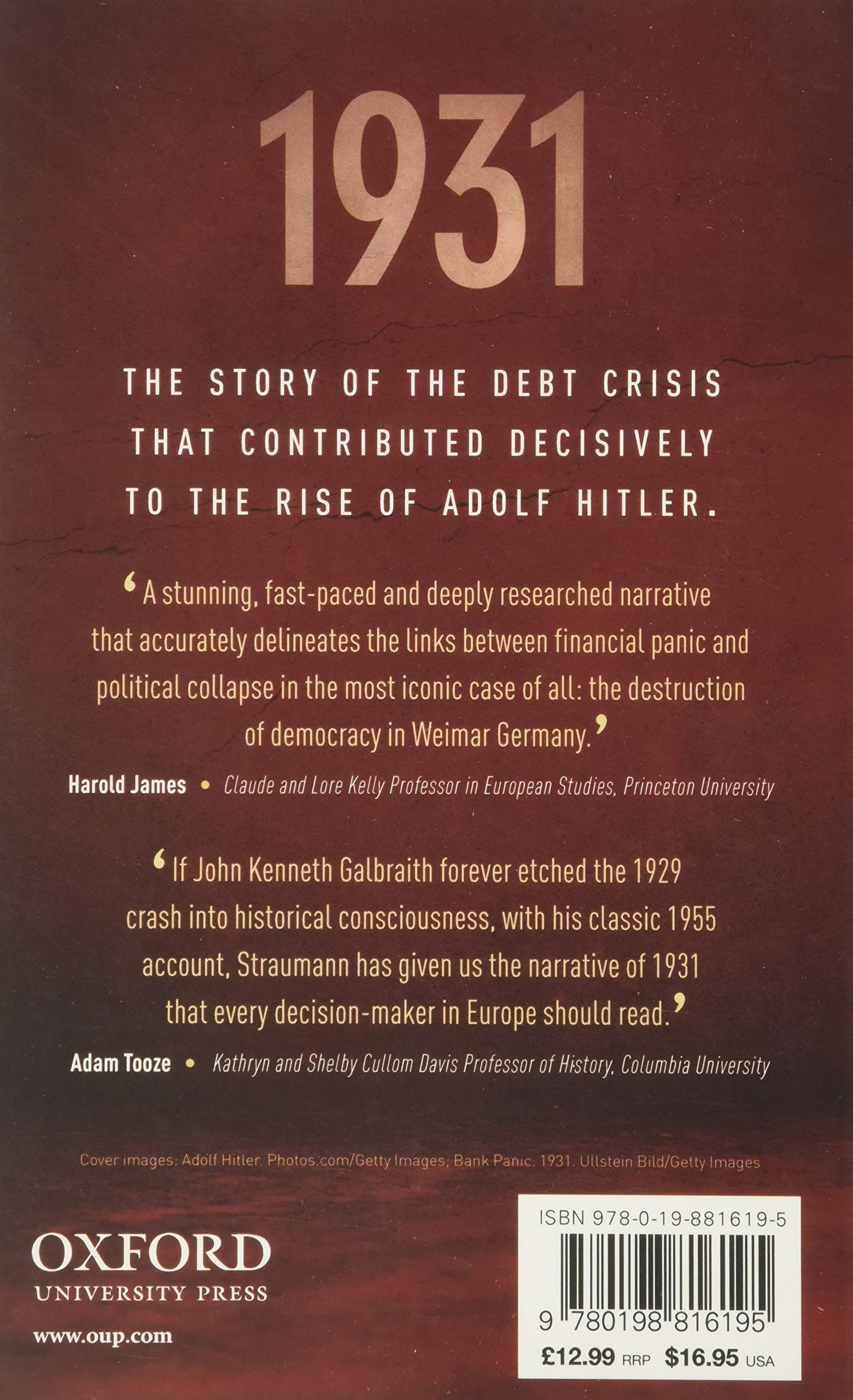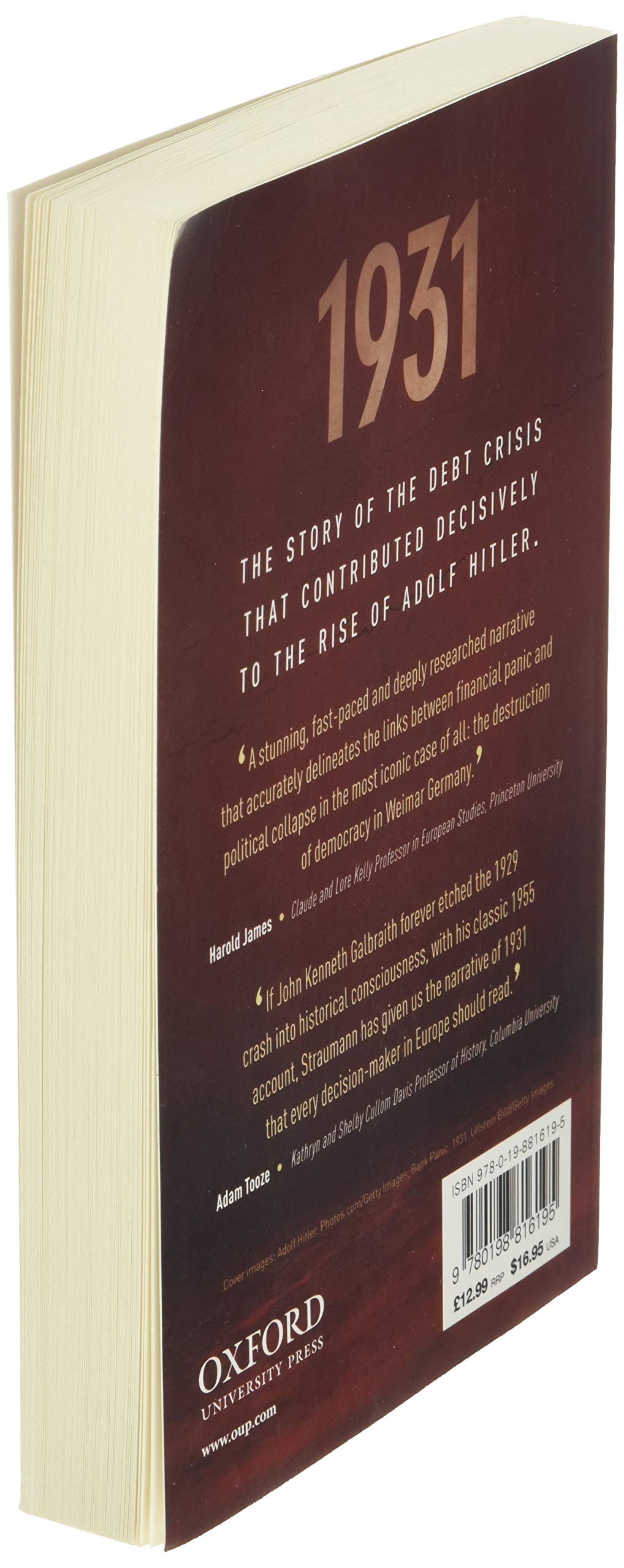Customer Services
Copyright © 2025 Desertcart Holdings Limited





1931: Debt, Crisis, and the Rise of Hitler
B**R
How Did It Happen
Provides insight into how a great nation devolved into dictatorial chaos with emphasis on the contributions of foreign nations and cautious politicians.
B**.
Excellent. Focuses on debt crises; occasional comments on their contributions to rise of the Nazis.
This is an excellent book on the national financial crises in Germany occurring in late 1929 - 1931. I thought the sub-title "Debt, Crisis, and The Rise of Hitler" is only partially correct: almost all the book discusses "debt and crisis" with only a few words every now and then describing Hitler's reactions (usually via quotes from his speeches) and commentaries on the Nazi's gains in representation in the Reichstag.The book discusses in great detail the economic punitive effects of the Versailles Treaty. It also discusses the failed efforts of the Dawes Plan and the Young Plan to paper over the fundamental problems. Essentially, the Plans called for the US to loan Germany money to pay the Versailles reparations to France, Britain, Belgium et al. as well as partially fund it's own budget and stimulate its economy. It couldn't work in the long term and it didn't.The book especially describes the financial crises that Chancellor Bruning (1930 -1932) had to deal with and the impossible situation he was in.The best book ever written on the economic stupidity of the Versailles Treaty is, of course, "The Economic Consequences of the Peace" by John Maynard Keynes and originally published in 1919. It's only 168 pages and is written in lay terms, so you don't need an economics degree to understand it. It is well worth reading, maybe before you read this book.
J**N
J Compton
1931 was an incredible read for those interested in economics and ww2. Well written and researched.
D**O
Important history that should not be forgotten
Gripping account of tumultuous times. Worth reading as much of what transpired can be applied to today’s world of financial stresses
B**A
Not sure how I heard about this, but very interesting.
I'm not sure where I heard about this, but really enjoyed it. Last year I read AND THEN THEY CAME FOR ME about Pastor Niemoller, a very readable book about the coming of the Nazi era from the perspective of a minister. "1931" is about the coming of the era, largely from the viewpoint of the finance and banking system. You could probably write a third book from the perspective of labor unions, a fourth from the perspective of the arts. In any case, this is a very detail rich book and yet it was very readable and I even followed most of it as an audiobook.
K**L
A thoughtful examination of the German Debt Crisis of 1931
Most people know a little about the hyper-inflation that led to the collapse of the Weimar Republic and the rise of Hitler. This book provides an in depth look at the debt issues that propelled the crisis. He does a fine job of explaining the difficulties that theGerman statesmen and economists faced. The book provides food for thought about the current economic situation.
C**T
A Nation's Debt
A sharp account of the financial mess in Germany that paved the way to the assumption of power by Hitler.This concise and informative book by Professor Straumann avoids being a dry economic analysis by both brisk writing and bringing in the personalities of the varied politicians and bankers across several countries who were directly involved in the German banking crisis of 1931. (One of the most interesting of these being the Raven of Zurich, Felix Somary.)The professor reminds us that high-stakes governmental financing of debt must take into account the ability of citizens to absorb the stresses of severe austerity. A related lesson is that caution that should be taken before imposing enormous long-term financial obligations on a sovereign nation. Finally, the personalities and abilities of leaders do matter.For those of us who avoid being immersed in economic theory, this book is a helpful reminder why the dismal science is as important as political theory to understanding the world in which we live. I think those in today's Euro-zone will have a special interest in the lessons that can be drawn from 1932.
G**S
Austerity and politics
This book is a must read not only for the light it sheds on the ill-fated Brüning chancellorship but for the warnings it provides for us in our current conjuncture. A vicious austerity foisted on Germany by its creditors' demands, the collapse of American capital flowing into Europe with the 1929 crash and the onset of the Great Depression and the political intransigence of the creditor countries to do the sensible things all contributed to the delegitimation of the liberal German republic and help lay out the welcome mat for Hitler and more 'extreme' solutions.
E**K
Interessant und lehrreich. Die bessere wissenschaftliche Literatur.
Wirklich Spaß zu lesen, Ein Buch, das man in die Hand nimmt und dann nicht mehr loslassen kann. Geschrieben mit Verständnis der historischen Realität des Young-Plans und seiner unvorhersehbaren Folgen.
N**R
THE NAZI CRASH
Few people will understand the bank crash of 1930s. No-one how bad it was in Germany - also central bankers didn't get the problems in Europe. I am not sure would be almost so bad in after ten years in the great crash now. The hatred in countries and indifference is every now. The author is a Swiss academic but he writes like a good reporters. The details are very interesting. People didn't how much would be chaos of Nazism. No one understood their views. You can see the anti-cosmopolitanism in British and US views now. Will we find again these awful views now? Will be?
S**I
Da leggere e consigliare
Una ricostruzione storica degli accadimenti che hanno lentamente ed inesorabilmente portato Hitler al potere.Oltre ad essere molto ben scritto, il vero merito dello storico è essere riuscito pienamente a contestualizzare i fatti di quel 1931, rendendo molto semplice per il lettore la comprensione dei meccanismi che hanno determinato gli eventi.Imbarazzante la similitudine con le dinamiche politiche internazionali in corso oggi.Motivo in più per leggere questo libro.
L**Y
Deja-vu?
Accurate and insighful on the slow descent of Germany into Nazism. How a financial crisis grew out of control and destabilised a country into a future that nobody could see.
Trustpilot
1 day ago
2 days ago